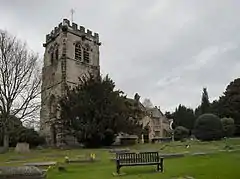Henry de Motlowe
Henry de Motlowe (died 1361) was an English-born judge who briefly held office as Lord Chief Justice of Ireland.[1]
He was born in Cheshire, to a family from Nether Alderley. His surname suggests that there was also a family link with Mobberley, five miles from Alderley, which was called Motburlege in the Domesday Book. He owned lands at Church Lawton, (then known as Bog-Lawton): in 1338 one Ralph de Lawton gave a quitclaim for all lands which were held in Church Lawton by Henry and his heirs.

He was already a senior official of the English Crown by 1346, when he appears on a commission in London to investigate the forgery of the Royal seal.[2] In the same year he was appointed Lord Chief Justice of Ireland, but seems to have spent no more than a few months in that office, since he was replaced in the same year by John de Rednesse, and he is shortly afterwards heard of as member of a Commission of Oyer and Terminer in Derbyshire.[3]
In 1357 he was made a judge of the Court of Common Pleas and in the same year he sat on another royal commission, to investigate an alleged affray between Simon Warde, a servant of John Gynwell, Bishop of Lincoln and certain members of the Order of Hospitallers, on whom Warde had been attempting to serve a summons to appear in a lawsuit. Ironically the future Prior of the Hospitallers, Richard de Wirkeley, who together with the then Prior, John Paveley, allegedly instigated the affray, had also been Lord Chief Justice of Ireland: the commission included yet another Irish Chief Justice, William de Notton.[4]
Motlowe died in 1361.[5]
References
- Ball, F. Elrington The Judges in Ireland 1221-1921 London John Murray 1926 Vol.1 p. 79
- Ball p. 79
- Ball p.79
- Calendar of Patent Rolls of Edward III May 9, 1357
- Ball p. 79
| Legal offices | ||
|---|---|---|
| Preceded by John le Hunt |
Lord Chief Justice of the King's Bench for Ireland 1346 |
Succeeded by John de Rednesse |